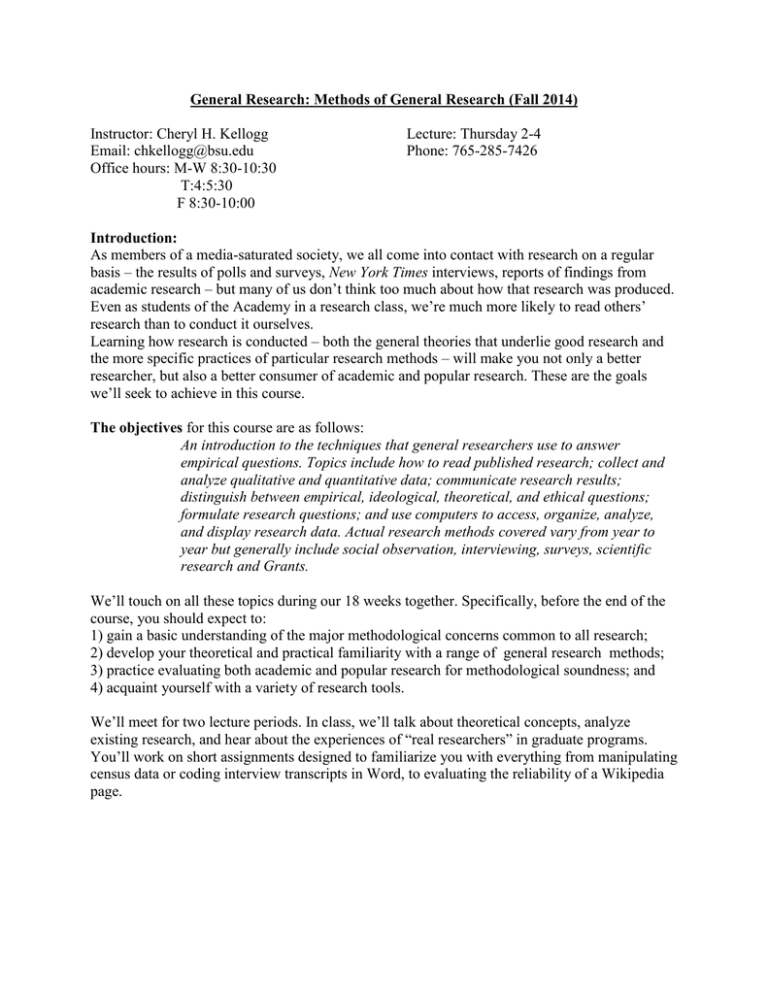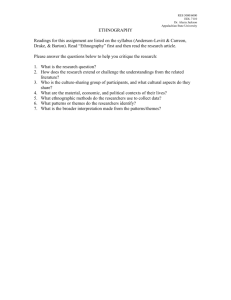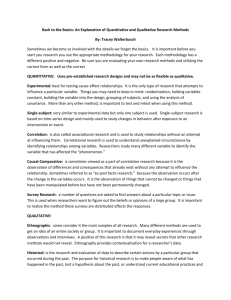General Research: Methods of General Research (Fall 2014
advertisement

General Research: Methods of General Research (Fall 2014) Instructor: Cheryl H. Kellogg Email: chkellogg@bsu.edu Office hours: M-W 8:30-10:30 T:4:5:30 F 8:30-10:00 Lecture: Thursday 2-4 Phone: 765-285-7426 Introduction: As members of a media-saturated society, we all come into contact with research on a regular basis – the results of polls and surveys, New York Times interviews, reports of findings from academic research – but many of us don’t think too much about how that research was produced. Even as students of the Academy in a research class, we’re much more likely to read others’ research than to conduct it ourselves. Learning how research is conducted – both the general theories that underlie good research and the more specific practices of particular research methods – will make you not only a better researcher, but also a better consumer of academic and popular research. These are the goals we’ll seek to achieve in this course. The objectives for this course are as follows: An introduction to the techniques that general researchers use to answer empirical questions. Topics include how to read published research; collect and analyze qualitative and quantitative data; communicate research results; distinguish between empirical, ideological, theoretical, and ethical questions; formulate research questions; and use computers to access, organize, analyze, and display research data. Actual research methods covered vary from year to year but generally include social observation, interviewing, surveys, scientific research and Grants. We’ll touch on all these topics during our 18 weeks together. Specifically, before the end of the course, you should expect to: 1) gain a basic understanding of the major methodological concerns common to all research; 2) develop your theoretical and practical familiarity with a range of general research methods; 3) practice evaluating both academic and popular research for methodological soundness; and 4) acquaint yourself with a variety of research tools. We’ll meet for two lecture periods. In class, we’ll talk about theoretical concepts, analyze existing research, and hear about the experiences of “real researchers” in graduate programs. You’ll work on short assignments designed to familiarize you with everything from manipulating census data or coding interview transcripts in Word, to evaluating the reliability of a Wikipedia page. Your assignments for the semester will encompass a range of activities and tap into many different skills. In addition to activities in class, you’ll undertake three short research exercises designed to get your hands dirty with a range of different research methods, as well as working with a few classmates to develop a methodological critique of a published piece of popular research. You’ll also demonstrate your new knowledge of the theory and practice of research design in a short mid-term oral exam and a take-home written final. REQUIRED TEXTS Sherri L. Jackson. 2011Research Methods and Statistics A critical thinking approach. Wadsworth Cengage Learning. Additional articles and book chapters available on Blackboard. COURSE REQUIREMENTS Grade Breakdown: Participation: 15% Reading Quizzes: 5% Research Exercises: 30% o SDA/GSS o Ethnography o Interviewing Midterm Oral Exam (due Week 8, sign up for a slot on Tuesday, Wednesday, or Thursday): 5% Group Project (analyzing public research – topic due Week 9, paper due Week 11, 20% Final Essay Exam (due 12-4, by email at noon): 25% Grade Scale: Your grade will be determined as a percentage of total possible points on the following scale: A = 94 –100% B = 83–86% C = 74 – 76% A- = 90 – 93% B- = 80–82% C- = 70 – 73% B+ = 87 – 89% C+ = 77–79% D* < 70% Attendance and Participation: Like most courses at the Academy, our course will include significant discussion; not preparing for class not only detracts from your own experience, but deprives your classmates of your insights into the material. With this in mind, I expect you to participate all class meetings, by completing all readings, and actively engage in class. If you have trouble thinking of things to say, take notes on the readings – this will often bring you to class with thoughts or questions that can then be used to help jump-start discussion. Not engaging in more than two classes will have a negative impact on your grade: if this will pose a problem for you, please come see me in office hours Reading Quizzes: At the beginning of each class period, I will administer a very brief reading quiz, worth 3 to 5 points. These quizzes are designed to make sure you’re keeping up with the reading, not to trick you or force you to remember obscure details. If you stay on top of the reading, you shouldn’t have any problem succeeding with the quizzes. If keeping up with course reading is a significant problem for you, come talk to me in office hours so we can discuss reading strategies. Research Exercises: In addition to teaching you the theory of conducting general science research, I also intend for this course to give you some first-hand experience with its practice. With this in mind, you’ll conduct three research exercises exploring quantitative data analysis, participant observation and interviewing. In all three cases, you will do your data collection and analysis before we’ve covered the associated method in depth: I don’t expect these assignments to be “expertly” constructed. Rather, my goal is to give you a taste of what it’s like to use the methods, which you can then bring to the discussion when we talk about them. Oral Midterm Exam: Set between the theoretical and practical halves of the course, your midterm will be a 10-minute conversation with me where we discuss a hypothetical research project and how you would handle theoretical issues of research design. Group Project: One of the main goals of this course is to teach you to be a smart consumer of research. Although we often associate the production and consumption of research with academia, the products of general research are also pervasive in our everyday lives. For this project, you will work with two or three classmates to critically analyze a piece of research produced for the general public: this can be a non-fiction book, a documentary, a series of written or audio news stories on the same topic, or something else approved by me. You will present your findings to your classmates on Thursday, Nov.20 (our last class before Thanksgiving break), and also assemble them in a 5-7 page paper due that day. Final Essay Exam: Your final paper for this course will be to draw up a 6- to 8-page research proposal, incorporating the major concepts we’ve learned over the semester. Although the project you’re pitching will be completely hypothetical (and you should feel free to dream big), I will expect you to give serious thought to how you would go about carrying it out. As with everything else, we’ll talk much more about this over the course of the semester. A note on class discussions: Discussion and debate are an important part of any intellectual undertaking. As researchers, we study the social world, the place where all of us live both inside and outside the classroom. Over the course of the semester, we may discuss topics that you have strong feelings about. You should always feel free to respectfully express your opinions on an issue, whether or not you believe they’re shared by other people in the room (including me). I only ask that you speak with good intentions, and assume that others are doing the same. If you are ever made angry or uncomfortable by something said in class, please feel free to speak up (politely), or to bring your concerns to me privately through email or in office hours. TENTATIVE COURSE SCHEDULE AND READING ASSIGNMENTS Please note I have the right to change this schedule if needed. I will make every attempt to notify you as soon as possible if that occurs. Week 1 : Course Overview – Why Do Research? No readings this week. Week 2: The Theory of Social Science Research In Class: What are several sources of knowledge in research, and what distinguishes it from other kinds of knowledge? Read Chapter 1, “Why Do Research?” pp. 1-24. In class: Types of research projects Week 3: What Does Good Research Look Like? In Class: Basic vocabulary for research results Read “Qualitative and Quantitative Measurement,” sections “Reliability and Validity,” “A Guide to Quantitative Measurement,” and “Scales and Indexes,” pp. Read Herrnstein, Richard J. & Charles Murray. 1994. The Bell Curve: Intelligence and Class Structure in American Life. Chapter 14, “Ethnic Inequalities in Relation to IQ,” pp. 317-340. In Class: Playing with data – SDA and GSS data exercise Week 4: The Ethics of Human Subjects Research In Class: Good research ethics Read Neuman Chapter 5, “How To Review the Literature and Conduct Ethical Studies,” section “Ethics,” pp. 143-159. Read Leo, Richard A. 1995. “Trial and Tribulations: Courts, Ethnography, and the Need for an Evidentiary Privilege for Academic Researchers.” The American Sociologist 26(1): 113-134. In Class: Being aware of researcher bias Read Collins, Patricia Hill, 1986. “Learning from the Outsider Within: The Sociological Significance of Black Feminist Thought.” Social Problems 33(6):S14-S32. Read a set of newspaper articles on a current issue (to be provided on Blackboard, more details forthcoming) In Class: Playing with data – US Census data exercise Week 5: Sampling In Class: The theory of sampling Read: Neuman Chapter 8, “Qualitative and Quantitative Sampling,” pp. 240-274. In Class: The practice of sampling Read Keller, Bill. “Introduction.” In Class Matters. 2005. New York: Times Books. pp. ix-xvii. Read Edin, Kathryn & Maria Kefalas. 2007. Promises I Can Keep: Why Poor Women Put Motherhood Before Marriage. Appendix A, “City, Neighborhood, and Family Characteristics and Research Methods,” pp. 225-240. Read Gallup, Inc. 2010. “How Are Polls Conducted?” From http://www.gallup.com/poll/101872/how-does-gallup-polling-work.aspx. pp. 1-4. Read NORC/GSS. 2006. “Appendix A – Sampling Design and Weighting.” From http://publicdata.norc.org:41000/gssbeta/codebook.html. pp. 1-19. Home work: Evaluating sources – looking at nonprofits, think tanks and government websites Week 6: Designing a Research Project: SDA/GSS assignment due. In Class: Discussion of evaluating sources and begin Developing your research project Read Neuman Chapter 6, “Strategies of Research Design,” pp. 163-193 In class: A research project from beginning to end Read Emery, Hannah B. 2013. “What’s In a Name?” American Parents’ Search for the Perfect Baby Name. Chapters 1 & 3, “Not Just ‘A Matter of Taste’: Names as Identity Markers” and “He Won’t Be an Ordinary Kid: Contemporary Parents’ Search for Distinctive Names” Homework: Finding what has gone before – the basics of library/journal research Week 7 and 8 Oral Exams-Midterm No lecture this week: sign up for a slot for your 10-minute oral exam on Tuesday, Wednesday or Thursday. Many more details to come. Week 9: Research Methods Survey and Comparative/Historical Research and Document Research In Class: Comparative/historical research and discuss reading groups and Document research and content analysis Group project topic due by email. Read Newman Chapter 14, “Historical-Comparative Research” (pp. 464-499) Read 1 of these (according to reading group): Choices will be posted on Blackboard. Read Neuman Chapter 11 (“Nonreactive Research and Secondary Analysis”) sections “Nonreactive Research,” and “Content Analysis,” (pp. 358-368) Presentation Guest Speaker presenting : Historical and document analysis researchers Week 10: Experiments and Presentations In class : Social science experiments Read Neuman Chapter 9, “Experimental Research,” pp. 275-304. Read 1 of these (according to reading group): Pager, Devah. 2003. “The Mark of a Criminal Record.” American Journal of Sociology 108(5):937-975. Czopp, Alexander M., Margo J. Monteith & Aimee Y. Mark. 2006. “Standing Up for a Change: Reducing Bias Through Interpersonal Confrontation.” Journal of Personality and Social Psychology 90(5):784-303. Presentation : experimental researchers Next Week: Group project due. Group presentations. Week 11:Group Projects and Group Presentations Week 12: Survey Research In Class: The basics of survey research Read Neuman Chapter 10, “Survey Research,” sections “A History of Survey Research,” “The Logic of Survey Research,” and “Types of Surveys,” pp. 308-313 & 337-354. Read 1 of these (according to reading group): Weinberg, Martin S. and Colin J. Williams. 2010. “Bare Bodies: Nudity, Gender, and the Looking Glass Body.” Sociological Forum 25(1):47-67. Streb, Matthew J., Barbara Burrell, Brian Frederick, and Michael A. Genovese. 2008. “Social Desirability Effects and Support for a Female American President.” Public Opinion Quarterly 72(1):76-89. In Class: Good and bad survey questions Read Neuman Chapter 10, “Survey Research,” section “Construction of the Questionnaire,” pp. 314-336. Read Powell, Brian, Catherine Bolzendahl, Claudia Geist, and Lala Carr Steelman. 2010. Counted Out: Same-Sex Relations and Americans’ Definitions of Family. Chapter 1 and Appendix 1.A and 1.B, pp. 1-15 and 219-242. Panel discussion: survey researchers IN class: Collecting data: designing a survey on SurveyMonkey Week 13:Working With Large Quantitative Datasets Class : The basics of large data sets Read Neuman Chapter 11, “Nonreactive Research and Secondary Analysis,” from section “Existing Statistics/Documents” to end (pp. 368-380) Read 1 of these (according to reading group): Hout, Michael & Claude S. Fischer. 2002. “Why More Americans Have No Religious Preference: Politics and Generations.” American Sociological Review 67(2):165190. O’Connell, Heather A. 2012. “The Impact of Slavery on Racial Inequality in Poverty in the Contemporary U.S. South.” Social Forces 90(3):713-734. In Class : Analysis of large-scale quantitative data Read Neuman Chapter 12, “Analysis of Quantitative Data” (pp. 383-419) Panel discussion 3-3:30: large quantitative dataset researchers Working with data: cleaning data in Excel Week 14 : Participant Observation and Ethnography In Class: The basics of ethnography – picking a site, access, etc. Read Neuman Chapter 13, “Field Research and Focus Groups,” pp. 420-460 Read Pascoe, C.J. 2007. Dude, You’re a Fag: Masculinity and Sexuality in High School. Chapter 1 and Appendix, pp. 1-24 and 175-193. In Class: How to take field notes – practice in lecture with a video Read Emerson, Robert M.; Rachel I. Fretz; Linda L. Shaw. 1995. Writing Ethnographic Fieldnotes. Chapter 2, “In the Field: Participating, Observing, and Jotting Notes.” pp. 21-43. Read Hoang, Kimberly Kay. 2011. “ ‘She’s Not a Low-Class Dirty Girl!’: Sex Work in Ho Chi Minh City, Vietnam.” Journal of Contemporary Ethnography 40(4):367-396. Panel discussion: ethnographic researchers Class : Data coding in Word Week 15: Thanksgiving Break Week 16: Ethnography and Interviewing In Class: Building rapport with respondents Read Lareau, Annette. 2003. Unequal Childhoods: Race, Class, and Family Life. Chapters 1 & 6, “Concerted Cultivation & the Accomplishment of Natural Growth” & “Developing a Child,” and Appendix A, “Methodology.” pp. 1-13, 108-133, 259274. In Class: The basics of interviewing Read Weiss, Robert S. 1994. Learning From Strangers: The Art and Method of Qualitative Interview Studies. Chapter 1, “Introduction” & Chapter 3, “Preparation for Interviewing.” pp. 1-14 & 39-59 Read Hertz, Rosanna. 2006. Single By Chance, Mothers By Choice: How Women are Choosing Parenthood Without Marriage and Creating the New American Family. Introduction, Chapter 1 and Appendix 2, pp. xv-xx, 3-20 and 222-229. In Class: Looking at specialty software and drafting letters Ethnography assignment Due Week 17 : Qualitative Data Analysis In Class: The interview process Read Weiss, Robert S. 1994. Learning From Strangers: The Art and Method of Qualitative Interview Studies. Chapter 4, “Interviewing.” pp. 61-120. Read Waters, Mary C. 1999. Black Identities: West Indian Immigrant Dreams and American Realities. Appendix: “Notes on Methodology.” pp. 347-372. Panel discussion interviewers In Class: Coding of qualitative data Interview assignment due. Read Neuman Chapter 15, “Analysis of Qualitative Data,” pp. 507-539. Presenting your data – charts, graphs and PowerPoints Week 18: Course Wrap up and Overview Final paper due by email 12-11-14 COURSE POLICIES Email Policy: I check email daily during the week, and will almost always respond within 24 hours. I don’t typically check email on the weekend. Email works best for procedural questions (setting up appointments, etc.); detailed questions about course material are usually easier to clarify in class or in office hours. Office Hours: Office hours are listed; if you have a scheduling conflict at this time, email me and we will arrange another time to meet. I encourage you to come by office hours regularly; they give you a chance to ask questions and talk about difficulties you’re having with the readings, your papers, or any other aspects of the class. You are always welcome to come to office hours in pairs or small groups. Grading Written Assignments: Part of your grade on written assignments will depend on the quality of your writing. Good writing is a key part of expressing your thoughts; the ideas you’re conveying can’t be unlinked from the words and sentences you’re using to present them. If writing is a challenge for you, come and talk to me: there are resources here at the Academy that can help you with writing skills. Assignment Submission Policy: To allow me to better track your progress through the semester, I ask that you submit all written materials by email on or before their due date. When emailing me assignments, please name the file according to this system: [LastName][FirstInitial]-[AssignmentTitle] (example: EmeryH-ReadingResponse1) Although you’re submitting materials electronically, they should still adhere to correct manuscript formatting: double-spaced, using twelve-point font (Times New Roman or equivalent) and one-inch margins. You should number your pages, and include your name at the top of the first page (you’d be amazed how many people forget to do that part). I will deduct points for incorrect formatting. Don’t do it! Late Assignment Policy: Assignments are due at the beginning of class on their scheduled due date. For all other assignments, if you hand in an assignment late, your grade will drop by 10 percentage points. II will not accept an assignment if it is more than a week late. If you have major extenuating circumstances (severe illness, family emergency), you must contact me in advance to request an extension, and be prepared to provide documentation if asked. Grade Disputes: I’m always happy to discuss grades with you. I ask that you wait twenty-four hours after receiving an assignment back before contacting me about discussing it (in other words, please don’t flag me down in the hall!). This will give you time to clearly identify what you want to dispute and organize your rationale for why the grade should be reconsidered. After collecting your thoughts, please write a short memo (1-2 paragraphs) explaining why you think your grade should be changed, then email it to me along with your request to meet. You must contact me within 7 days of getting an assignment back. You will be asked to bring the graded assignment to the meeting. After talking with you and reviewing your memo and assignment, I will give you my decision by email within 2 days. Please be aware that I may lower as well as raise grades after review. Electronics in Class: Our class is discussion-based, and we’ve all experienced the distraction potential of electronics in the classroom. For this reason, I ask that you please keep your cell phone on silent and out of your sight during class. I also reserve the right to ban the use of other electronic devices (laptops, tablets, etc.) in class if I feel they’re impeding our discussion. If the inability to use one of these devices in class will present a significant problem for you, please come see me in office hours. Academic Integrity: Plagiarism is strictly forbidden. Plagiarism is defined as “intentionally or knowingly using someone else’s ideas, words, and/or thoughts without properly crediting the source”. Any time you draw on another person’s work, you must use proper citations. If you have questions on how to do this, come talk to me. As a general rule, if you are quoting a published source (or a Web site) and the quotation is short, put it in quotation marks; if you quote a longer passage, indent it and single-space. In both cases, be sure to cite the original source in a footnote or in parentheses. Accommodation Policy: If you require special accommodations for this class, please let me know as soon as possible.





